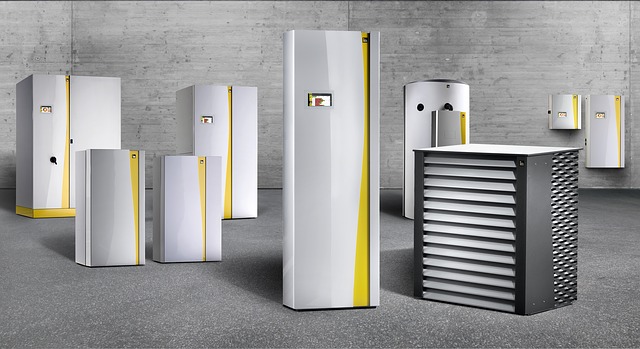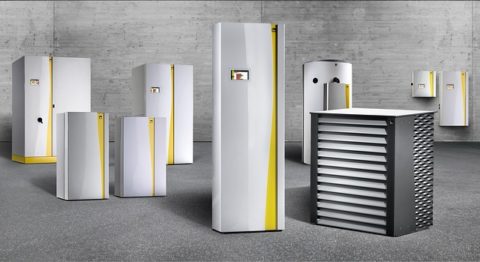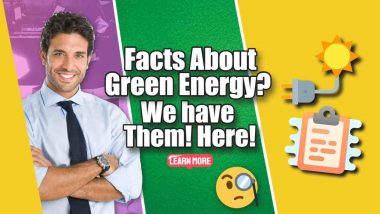Here we will demystify for you heat pump systems, what they are and how they are used, both for air and ground source heating and cooling/ air conditioning. In heating mode, well-designed heat pump installations are three to four times more effective at heating than simple electrical resistance heaters using the same amount of electricity.
They come in two types as far as the heat source is concerned; ground source (heat from under the ground) and air source (heat from the air around the heating/ cooling device.)
The Renewable Heat Incentive (RHI)
In the UK heat pumps are eligible for the renewable heat incentive (RHI). This can make their installation worthwhile in borderline circumstances. As of April 2017, the Domestic RHI payments for Ground Source Heat Pumps will be capped at 30,000 kWh. With the likely future increases to the Renewable Heat Incentive (RHI) over the next few years, installers of heat pump systems may well be able to get a pretty good return on investment.
Air Source Heat Pumps
Air source versions are relatively easy and inexpensive to install and have therefore historically been the most widely used heat pump type. However, ground-water heat pumps are more efficient than air-water heat pumps, and therefore they are often the better choice for providing heat for the floor heating and domestic hot water systems. They will raise your electricity bill but lower your costs for other heating fuels. They can also provide both space and water heating, thus significantly lowering fuel bills.
Compression and Absorption heat Pumping
The two main technologies for accomplishing heat-pumping are compression and absorption. Absorption heat pumps often use mixtures of water and lithium bromide or water and ammonia. And, all heating devices of this type transfer heat from a less high-grade energy source to that when it is released as heat.
Heat Pump Costs
From the point of view of initial cost they are at a price disadvantage compared to conventional heating solutions like boilers. The reason why they are popular is that there are usually long-term savings. Indeed, after a few years of use the investment is paid back and from then on, heat pumps can provide significant savings over traditional heating systems, due to their low running costs. Workmanship warranties for heat pumps can last up to 10 years, for example through QANW (Quality Assured National Warranties). Generally, you will find that heat pump systems will come with a warranty that lasts around two or three years.
Heat Pumps That Also Cool!
Heat pumps can also work as a cooling systems in the summer months. Well-known examples in our modern environment are refrigerators and air conditioning units but they can also be used to heat spaces in our homes and businesses. Depending on the system and property specifications, air and ground source heat pumps can be integrated with existing heating systems.
The technology is constantly improving in the quest for greater efficiency. Advances in heat pumping systems and air conditioners are often led by legislative measures on the minimum efficiency standards which will attract the subsidies on-offer. Unlike conventional systems that use water to capture and transport the available heat, air and ground-source heat pumps often use a glycol-based heat transfer fluid.
Heat Pumping in Winter
During UK winters the warming air-source pumps can attain output temperatures of 65 degrees or more, if they are designed to do so, but their efficiency will decrease and running costs will increase during cold weather. And, air source versions can generate less CO2 than conventional heating systems.
Heat Pumping and the Environment
For those who seek ways to protect the environment through the way they live there lives will welcome the news that by switching to a renewable energy provider, your heat pumps can effectively run on completely clean energy.
Save Energy Bills with Heat Pumps
Heat pumps can save you more on your heating bills if you’re replacing an electric, oil, LPG (liquefied petroleum gas) or coal system, rather than gas. While they can be easily connected to existing radiators, this is not the most effective way of utilizing the heat generated, for they require a high level of heat.
Ground-source heat pumps often are equipped with a de-superheater, which uses excess heat to produce domestic hot water. The underground piping often carries warranties of 25 to 50 years, and the heat pumps often last 20 years or more. Many people find that heat pumps often win-out when it comes to making a great investment that will provide the most solutions over the long term. For instance, hot water only heat pumps will often be performance rated through Eco-design Lot 2 (water heaters). As a consequence, these products can be fast tracked into SAP using a database driven drop down table.
The savings you can make using air of ground source heat pumps will be affected by a number of factors including building construction, the heating fuel being replaced and the type of heat distribution system in use (radiators, warm air or underfloor for example). The good news is that the latest models of many air source heat pumps often do not need ducting in order to distribute cooling or heating.
Heat Transfer Fluid
Unlike conventional systems that use water to capture and transport the available heat, air and ground-source heat pumps often use a glycol-based heat transfer fluid.
Heat Pump System Costs
Air source heat pumps will be installed outside your property and are very quiet during operation. But to be realistic, the relatively high initial cost of installing heat pumps may mean that if you are looking for a cheap way of becoming more energy efficient and saving on energy bills, other ways such as loft or cavity wall insulation may be more appropriate.
Air-to-water heat pumps may be best suited to new-build properties. But, always do bear-in-mind that in climates with sub-freezing winter temperatures, air to water heat pumps may not be cost-effective for all your heating needs. Some high temperature heat pumps will work with existing radiator systems but traditional low temperature heat pumps will require the use of low temperature or over-sized radiators.
Conclusion
Most people are “pumped” when heat pumping systems described to them. There are clearly, advantages when you choose this technology to heat your home. But, although a number of elements need to be in place to enable growth, wide uptake of heat pumps will not be realized unless a cost effective and efficient supply chain is in place to manufacture and deliver the required scale. However, the good news is that the latest models of many air source heat pumps often do not need ducting in order to distribute cooling or heating.




